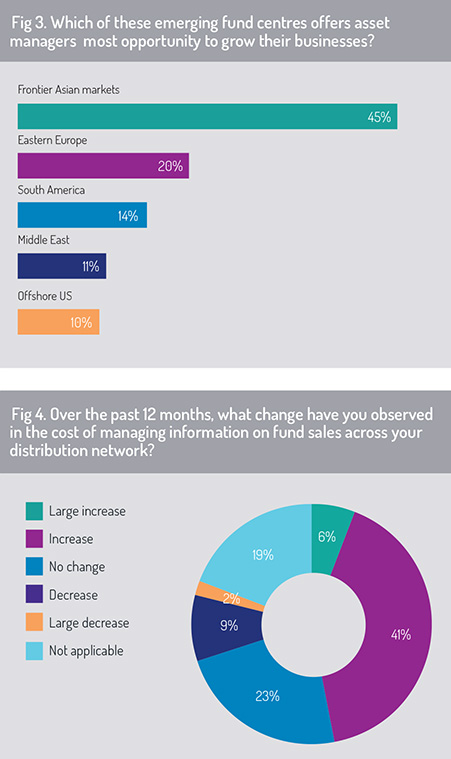Looking globally, the survey explored which emerging fund centres are likely to provide the best opportunities for asset management companies to grow their business (fig 3). Frontier markets in Asia are resoundingly seen as the most attractive destination for asset gathering and business expansion, with more than twice as many respondents selecting this answer (45%) than any other. Eastern Europe also offers an attractive environment for business expansion, providing investment exposure to growth opportunities in Russia, Poland, the Czech Republic, Hungary and other expanding European fund markets.
Some optimism persists regarding South American and Middle East fund markets, although growth in these regions has been concentrated in a relatively small number of markets and has been slower than some investors might have anticipated over the past ten years.
Managing information on fund sales
Fund management companies are constantly seeking ways to strengthen their access to information on fund sales across their global distribution networks. This data is required to evaluate the performance of sales teams within the company and to assess performance and opportunity across a firm’s distribution network by jurisdiction and by sales channel.
As well as providing crucial insights on sales performance, this data is also important in supporting regulatory compliance obligations. Under the second Markets in Financial Instruments Directive (MiFID II), for example, a management company must, under its product approval process, define a “target market” of end clients for each financial instrument that it sells. It must then take reasonable steps to ensure that the financial product is distributed only to this identified target market and that risks relating to these product sales are evaluated on a continuous basis. With this in mind, MiFID II requires an asset manager to:
• Implement a product approval process which specifies an identified “target market” of end clients for each financial instrument. An asset management company must ensure that all risks relevant to the identified target market are assessed and that it operates a distribution strategy consistent with this identified target market.
• Review financial instruments that it markets on an ongoing basis, taking into consideration any event that could materially affect the potential risk to the identified target market. In doing so, it must monitor on a continuous basis whether the intended distribution strategy remains appropriate.
• Make available to distributors all relevant information on the financial instrument and the product approval process, including the identified target market of the financial instrument.
Information on end investors may also be required to meet regulatory compliance requirements under KYC and AML legislation. When selling financial products, firms are required to adopt a risk-based approach to anti-money laundering (AML) and counter-terrorist financing (CTF) in line with the European Supervisory Authorities’ (ESA) guidelines on AML/CTF risk factors. This may require access to information on the end investor – for example, to determine where “enhanced due diligence” needs to be applied in “higher-risk” situations.
This data collection requirement is essential to asset managers’ ability to evaluate sales performance and to meet regulatory compliance obligations (fig 4).
This all comes with a cost, however. Over the past 12 months, almost two-thirds of respondents indicated that they had seen an increase in the cost of managing information on fund sales across their distribution networks – and 41% of these said this represented a large increase in cost. In contrast, only just over 10% found that the cost of this information management obligation had fallen over the past year.
Looking more closely by respondent type, respondents identifying themselves as fund distributors pointed to the largest increase in cost – 63% said costs had increased, with 8% saying there had been a large increase. The fund administrator community also identified a significant increase in costs – 43% said costs had increased, of which 9% said there had been a large increase. For respondents from the manufacturing segment, 46% said there had been an increase in the cost of managing information on fund sales (although none said there had been a large increase).
©2019 funds europe





